| Srl | Item |
| 1 |
ID:
137299
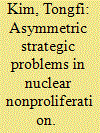

|
|
|
|
|
| Summary/Abstract |
This article explains cooperation problems between powerful democratic states and weak non-democratic states in the context of nuclear nonproliferation. Focusing on the interactions of the United States with North Korea, Iran, and Libya, it suggests that power asymmetry and information asymmetry foster mutual distrust by exacerbating two main strategic obstacles to cooperation: the time inconsistency of the stronger state's policy and the incomplete information regarding the non-democratic states. The nature of negotiations over nuclear weapons programs further exacerbates these problems. The overall implications of this article leave us pessimistic about the possibility of negotiated nuclear disarmament, but the theoretical analysis may help the negotiation strategy of the United States.
|
|
|
|
|
|
|
|
|
|
|
|
|
|
|
|
| 2 |
ID:
138093
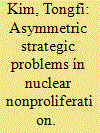

|
|
|
|
|
| Summary/Abstract |
This article explains cooperation problems between powerful democratic states and weak non-democratic states in the context of nuclear nonproliferation. Focusing on the interactions of the United States with North Korea, Iran, and Libya, it suggests that power asymmetry and information asymmetry foster mutual distrust by exacerbating two main strategic obstacles to cooperation: the time inconsistency of the stronger state’s policy and the incomplete information regarding the nondemocratic states. The nature of negotiations over nuclear weapons programs further exacerbates these problems. The overall implications of this article leave us pessimistic about the possibility of negotiated nuclear disarmament, but the theoretical analysis may help the negotiation strategy of the United States.
|
|
|
|
|
|
|
|
|
|
|
|
|
|
|
|
| 3 |
ID:
184244
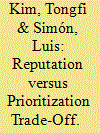

|
|
|
|
|
| Summary/Abstract |
Under what circumstances is a protégé likely to perceive its patron’s extended deterrence commitments in another region as positive or negative for its own security? Protégés from distant regions see complementary reputational links between the credibility of a patron’s extended deterrence commitments in each other’s region. However, they are in a competitive relationship when it comes to the allocation of the patron’s resources. We call this the reputation versus prioritization trade-off. We argue that whether protégés assign more importance to their patron’s reputation or to being prioritized by said patron is a function of their dynamic perceptions of their regional security environment. These are, in turn, determined by their perception of their patron’s resource constraints and the threat posed by an adversary. To test our argument, we examine how Japan has perceived America’s evolving security commitment in Europe and how Poland has perceived the evolving US commitment in Asia.
|
|
|
|
|
|
|
|
|
|
|
|
|
|
|
|
| 4 |
ID:
129901
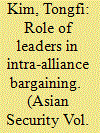

|
|
|
|
|
| Publication |
2014.
|
| Summary/Abstract |
This article develops a theory about the role of leaders in long-term international bargaining, specifically in the context of negotiations within existing military alliances. The international relations literature suggests that domestic opposition (to cooperation on a particular issue) increases a state's bargaining power vis-á-vis its negotiating partner. This study confirms that domestic opposition to cooperation generally increases a state's bargaining power at the international level, but it suggests that domestic opposition to the state's leader - which affects the leader's vulnerability - does not have a uniform effect on the country's bargaining power. It demonstrates the central role a state leader plays in international bargaining and explains the dynamics of alliance negotiations left unexplained in the literature. In order to examine the argument, this study uses "structured, focused comparison" of the U.S. alliances with Japan and Spain.
|
|
|
|
|
|
|
|
|
|
|
|
|
|
|
|
| 5 |
ID:
107159
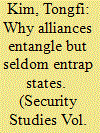

|
|
|
|
|
| Publication |
2011.
|
| Summary/Abstract |
This paper explains one of the central roles of alliance contracts, the prevention of undesirable military entanglement. The existing literature on alliances argues that entrapment is a major concern for potential and actual alliance partners, but it is difficult to point out clear cases of entrapment. I provide two answers to this puzzle: First, entrapment is a narrower concept than others have realized, and it is rarer than the literature suggests. Second, leaders anticipate entrapment and carefully design alliance agreements before and after states form alliances. I examine the second argument through case studies of us alliance agreements with South Korea, Japan, and Spain.
|
|
|
|
|
|
|
|
|
|
|
|
|
|
|
|